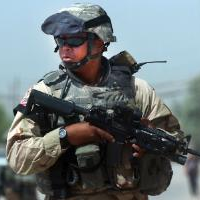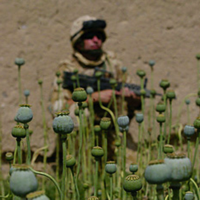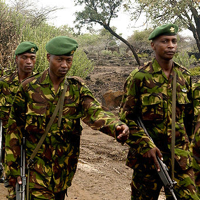Increased U.S. funding to fight drugs and organized crime in Mexico and Central America has attracted a good deal of attention in recent years. But flying largely under the radar is the growing role being played in that effort by the U.S. military, most notably now in Honduras, where U.S. Marines are engaged in a joint training exercise with Honduran troops and the Pentagon is financing a new naval base. “There’s been a noticeable uptick in U.S. military aid and cooperation in Honduras during the past year,” says Adam Isacson, senior associate for regional security policy at the Washington Office […]
War & Conflict Archive
Free Newsletter

In a recent World Politics Review article, U.S. Army Col. Gian Gentile declared that COIN is “dead” as the motivating intellectual concept for the U.S. Army. Although combat continues in Afghanistan, to some extent guided by the precepts set forth in the Army’s “Field Manual 3-24: Counterinsurgency,” Gentile argues that the inability of COIN doctrine to produce a definitive outcome in Afghanistan, along with the end of fighting in Iraq, serves to render the school of thought obsolete. Indeed, Gentile argues that the Army should abandon the “search for lessons of strategic value from the past 10 years of counterinsurgency […]

On Sept. 26, deep inside Taliban-controlled territory in Afghanistan’s Helmand province, Afghan counternarcotics agents backed by their Australian counterparts seized and destroyed $350 million worth of illegal narcotics. The operation set a record for drug seizures in Afghanistan, according to the U.S. Drug Enforcement Administration. Two weeks earlier, the same authorities busted the largest heroin-producing facility found in Afghanistan since 2006, capturing drugs worth $150 million if sold in the U.S. Both operations took millions of dollars from the pockets of insurgents who might otherwise use the money to buy weapons and ultimately mount narco-terrorist attacks inside Afghanistan. But a […]
The international offensive against the Islamist al-Shabaab organization in Somalia appeared to take a new turn last week as hundreds of Ethiopian troops accompanied by armored personnel carriers reportedly crossed the border into the famine- and war-torn nation. The U.S. had already expanded its drone war into Somalia over the summer, and Kenyan troops have been fighting al-Shabaab in southern Somalia since last month. A significant incursion now by Ethiopia could shift the dynamics of the already chaotic war. But according to Bronwyn E. Bruton, deputy director of the Michael S. Ansari Africa Center at the Atlantic Council in Washington, […]

In a speech at the Center for Strategic and International Studies (CSIS) in Washington last Friday, Viktor Ivanov, the director of Russia’s Federal Drug Control Service (FSKN), laid out an ambitious agenda for increased Russia-U.S. cooperation in several counternarcotics areas, characterized by “new thinking” on a variety of issues. Ivanov, who stopped in Washington after attending the fifth meeting of the Counternarcotics Working Group of the U.S.-Russia Presidential Commission in Chicago, proposed creating an integrated command for counternarcotics efforts in Afghanistan that would include representatives from the FSKN, the U.S. Drug Enforcement Administration and the NATO-led International Security Assistance Force […]

There is perhaps no better measure of the failure of American strategy over the past decade than the fact that in both Iraq and Afghanistan, tactical objectives have been used to define victory. In particular, both wars have been characterized by an all-encompassing obsession with the methods and tactics of counterinsurgency. To be sure, the tactics of counterinsurgency require political and cultural acumen to build host-nation governments and economies. But understanding the political aspects of counterinsurgency tactics is fundamentally different from understanding core American political objectives and then defining a cost-effective strategy to achieve them. If it is to avoid […]

Nairobi’s Operation Linda Nchi, or Protect the Country, was launched in October as a counterterrorism measure after kidnappings of foreign tourists and aid workers inside of Kenya were linked to the Somalian militant group al-Shabaab. For a country that has seen lucrative tourism revenues, especially from cruise ship visits, dry up in the wake of the instability emanating from Somalia, the abductions were the last straw. But an unintended side benefit of the intervention has been its impact on piracy. In the face of the military operation, with Kenyan army units pushing up toward the port of Kismayo, Somali pirate […]
In October, Turkey invoked the principle of hot pursuit to send hundreds of troops across its border with Iraq following an attack by Kurdish militants within Turkey. In an email interview, Geoffrey S. Corn, professor of law at South Texas College of Law, discussed the international norms of hot pursuit. WPR: What are the main international norms governing hot pursuit across international borders? Geoffrey S. Corn: Article 2(4) of the United Nations Charter obligates states to respect the territorial integrity of other states and prohibits military interference with the sovereignty of other states. International law condemns violating this obligation as […]
The recent revelation that the Drug Enforcement Administration is operating several militarized commando squads in Latin America signals an apparent U.S. eagerness to begin using covert counternarcotics strategies honed in Afghanistan over the past decade in the Western Hemisphere. The DEA’s so-called FAST team program — Foreign-deployed Advisory Support Teams — was reportedly created during the Bush administration to investigate Taliban-linked drug traffickers in Afghanistan. While their deployment now to Honduras, Guatemala, Dominican Republic, Haiti and Belize signals a new development, in some ways it actually represents a return to the program’s historical roots, which can be traced back to […]

Under what circumstances could the United States and China go to war? A recently released RAND report (.pdf) examined this question and unsurprisingly concluded that war between the two countries was improbable, even while identifying North Korea and Taiwan as the two most likely flashpoints. The report found that a war with China was improbable because the costs in any scenario would be virtually incalculable, in large part because it might induce a global financial collapse. Nevertheless, U.S. and Chinese military strategists will continue long-term planning for war scenarios against one another, with a time horizon of up to 50 […]
